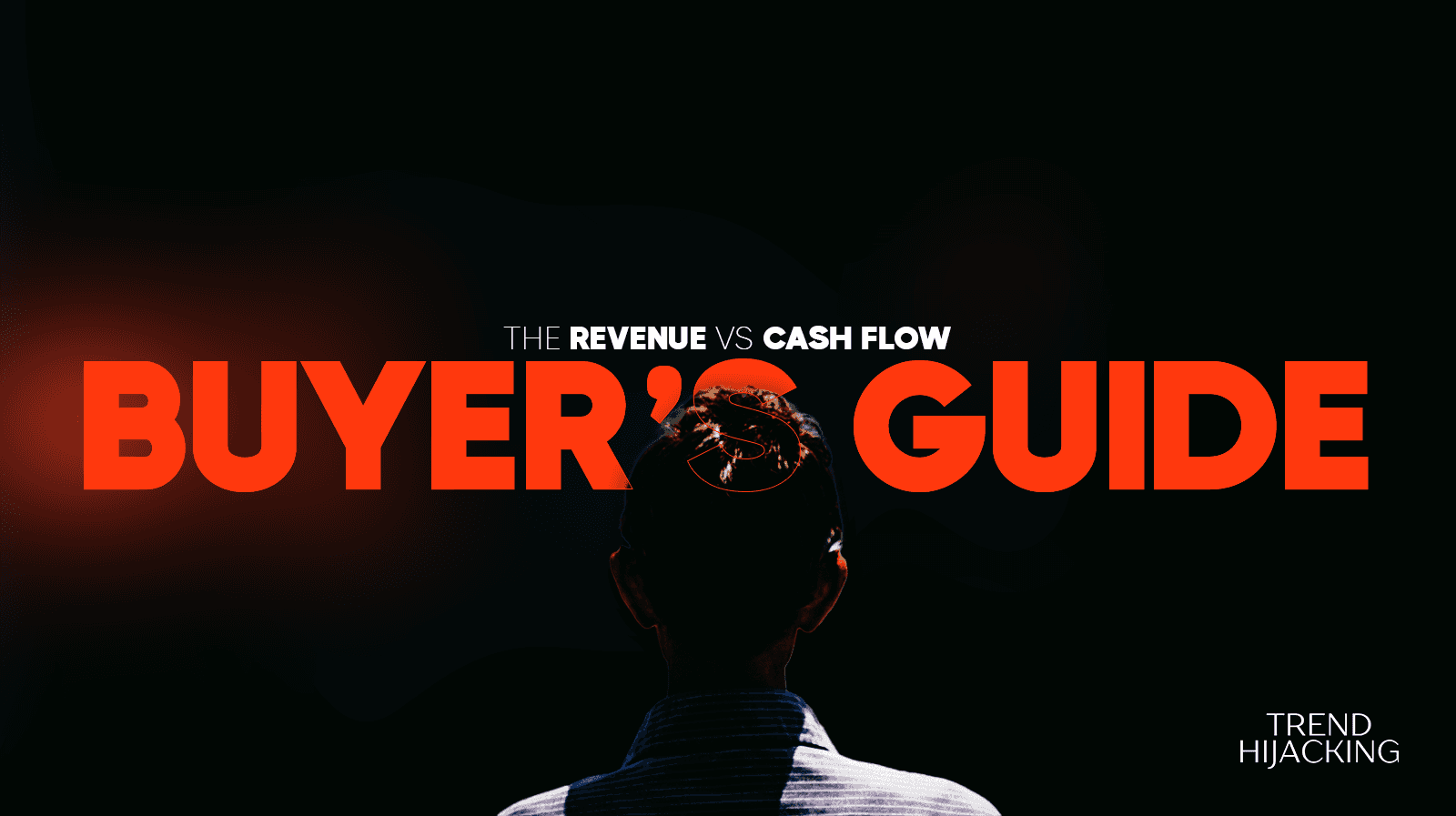17 Questions To Ask When Buying An Online Business
1. How Does The Business Make Money?

This is the first (and most important) question to ask the seller because everything else depends on it. You need to know if income comes from ads, affiliate programs, selling products, or offering services.
Each earning model has strengths and risks. For example, if revenue comes only from one affiliate partner, that partner could cut rates tomorrow, and your income drops overnight. A clear answer helps you decide if the model is stable or fragile.
We Help You Buy / Build, Manage and Scale E-commerce Brands for an EXIT
E-commerce Simplified for Busy Individuals – We handle the buying, building, and scaling, so you can focus on what matters.
Growth-Focused Strategies – From sourcing to marketing, we drive growth and prepare you for a profitable exit.
Expertly Managed Exits – We build a high-value brand designed for a Lucrative exit.
2. What Are The Monthly Revenue And Profit Numbers?

You need hard numbers, not guesses. And asking this question will help you understand just that. Ask the owner for monthly revenue and profit for at least the past twelve months.
Once you have this data at hand, look for trends. Is income steady, growing, or shrinking? A sudden dip might signal trouble. Buyers will always pay more for businesses with steady profit growth than for those with up-and-down income.
3. What Expenses Will I Inherit?

Every business has expenses to meet to keep it running smoothly. This can be anything from hosting, software tools, contractor fees, shipping, ads, etc. Ask for a list of all recurring expenses. Look at invoices or statements. Once you understand a business’s costs in advance, you can easily judge if the profit margins are strong or weak.
4. How Much Traffic Does The Site Get?

Traffic is the lifeblood of any online business, which makes it a must-check factor when acquiring an online-based business. Traffic shows you how many people visit the website and how they engage. Ask for reports from Google Analytics or a similar tool. Carefully evaluate the page views, unique visitors, and bounce rate. A site with shrinking traffic may not be worth the asking price.
5. Where Does The Traffic Come From?

Still on the traffic factor, you should also understand that not all traffic is equal. As such, you want to check if the site’s visitors come from search engines, social media, email, or paid ads. In most cases, organic traffic always beats the other forms of traffic. Therefore, if a business depends only on paid ads, you may lose traffic as soon as you stop spending money.
We Help You Buy / Build, Manage and Scale E-commerce Brands for an EXIT
E-commerce Simplified for Busy Individuals – We handle the buying, building, and scaling, so you can focus on what matters.
Growth-Focused Strategies – From sourcing to marketing, we drive growth and prepare you for a profitable exit.
Expertly Managed Exits – We build a high-value brand designed for a Lucrative exit.
6. Who Are The Main Customers Or Audience?

Every business has an audience, and understanding that before taking over the business is just as important. Ask who buys the product or who reads the content. What age, location, or interests do they have? If the business cannot describe its audience, take it as a warning sign. You want to know who you’re serving so you can keep them happy and grow.
7. What Contracts Or Agreements Are In Place?

The business you’ll be acquiring most probably comes with suppliers, freelancers, affiliates, and advertisers. All these often work under contracts, which you need to see before closing the deal. Some contracts may not transfer to you after the sale. Others may have hidden terms. Clear answers here keep you from being stuck with bad deals.
8. Do You (the seller) Own The Content And Assets?

This includes logos, code, articles, images, videos, and email lists. Make sure the seller has the rights to them and can transfer them to you. If not, you may face copyright issues later. You should never assume that online assets automatically come with the sale.
9. Has The Business Faced Legal Or Compliance Problems?

Ask about any existing lawsuits, fines, or bans (whether present or past). If the site was ever flagged for spam or copyright, you need to know. Why? Because a negative history associated with the business could harm your future growth. The seller should be upfront about any legal risks.
10. How Dependent Is The Business On One Source?

You know how the old saying goes: never put all your eggs in one basket. This applies to online businesses as well. Think of a business that gets 80% of visitors from one social media platform. Or maybe has one product bringing in 90% of its revenue. Such heavy dependence is risky. If the source fails, the business can crash overnight. You want a business that diversifies in both traffic and revenue.
11. How Much Time Does It Take To Eun The Business?

This is one of the “right questions to ask when buying an online business” that most new acquisition entrepreneurs overlook. You need to ask how many hours per week the current owner spends. Find out what the specific tasks are daily, weekly, or monthly. If the seller says it takes one hour a week, ask them to show you proof. Some businesses need more time than owners admit.
12. What Tools And Systems Does The Business Use?

A business that runs online will most probably be using some kind of software for email, payments, content, and support matters. It therefore makes sense to ask the seller what tools are in place, how much they cost, and how easy they are to learn. If the systems are old or complicated, you may need to upgrade, which adds costs.
13. What Risks Or Challenges Should I Expect?

What could be better than getting to know the risks and challenges of a business you’re about to buy from someone who’s actually been through it? Ask the seller directly what keeps them up at night. They may reveal typical issues such as strong competition, high ad costs, or Google search changes. The truth is, every business has risks. And you want to know them before you buy, not after.
14. How Will The Transition And Training Work?

Most sellers offer some post-sale support; this is simply some help on how to run the business during the first weeks or months after acquisition. Ask the seller if they’re willing to offer this kind of support and how long they will stay involved. Will they train you? Will they answer questions after the handover? A smooth transition lowers stress and keeps your customers happy.
15. How Did You Decide On This Asking Price?

Valuing a business on sale isn’t based on guesswork. Rather, it’s based on existing guidelines (read “multiples”). For instance, in our area of experience—which is acquiring e-commerce businesses—valuation is based on profit multiples. The same applies to many other online businesses. You should know how the seller arrived at the asking price. If the seller’s price is far outside the average, ask why. This helps you see if the deal is fair.
16. What Skills Or Resources Do I Need To Run This Business Well?

Not every buyer is a perfect fit for every business. A dropshipping store might need strong ad management skills. A content site might require SEO knowledge. A subscription service might need supplier relationships. One of our clients almost bought an e-commerce store that relied heavily on constant TikTok campaigns. They didn’t have those skills, so it would have failed under their ownership. By asking this question, you can match the business to your abilities or plan to hire help before you commit.
17. Why Are You Selling This Business?

And here is the most overlooked question of all: Why are you selling the business? This is the question that often reveals the truth behind the sale. Some sellers exit because they want to retire, move on to a new project, or free up time. Those are valid reasons.
But sometimes the reason is less positive. Maybe sales are dropping, ad costs are rising, or competition is getting stronger. We’ve seen sellers who frame a sale as a “great growth opportunity” when in reality, the business had already peaked.
When you ask this question directly and listen closely, you can spot whether the seller is being honest. If their answer is vague, that’s a red flag!
What’s Next?
Now you know the top-most important questions to ask when buying an online business. Asking these 17 smart questions gives you a clear view of what you’re really buying. You get to uncover the numbers, risks, workload, and the seller’s true motives. The answers help you judge if the business fits your skills and is worth the price. Go slow, ask directly, and trust the numbers. That’s how you avoid surprises and buy a business that keeps growing.
Buying a business doesn’t have to be risky or stressful for you. With our Smart Acquisition service, we help guide you through every step of the acquisition, including asking the right questions, spotting hidden issues, and securing a profitable, scalable deal. Our process helps you acquire a business you can grow or sell for a premium profit, all in just 60 days. Visit ourSmart Acquisition program to learn more.
A Done-For-You E-commerce Business
Discover how we Build, Launch, and Scale a 6-figure/month Business for You
Learn more
The 6-Step Blueprint to E-Commerce Acquisition
See how we Acquire, Convert, and Scale with Real Case Studies to Prove It.




















